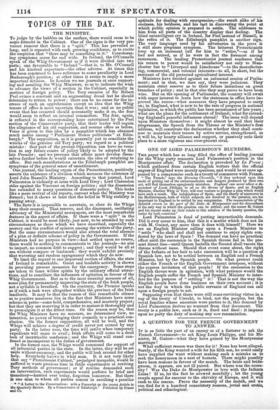ONE OF LORD PALMERSTON'S BLUNDERS.
Tax paper which has so long filled the office of leading journal for the Whig party reasserts Lord Palmerston's position in the Montpensier affair. The declaration is provoked by La Presse ; which gathered from certain English writers that the official angers of England were merely specious, and would be at once ap- peased by a compromise such as a treaty of commerce with France. " The bench," says the Morning Chronicle, " if they reckoned upon this mode of getting out of the embarrassments and dangers produced by their own act, will find themselves egregiously mistaken. England can never allow a de- scendant of Louis Philippe to sit on the throne of Spain; and no English Minister, whether Whig or Tory, will ever venture to propose a plan which would have such a result, The independence of Spain, and the liberty of commerce in the Mediterranean, both of which subjects are involved in the question, are too important to England to be settled by any compromise. The renunciation of the Spanish crown on the part of the Duke de Montpensier and his descendants is the only way in which the question can be settled; and the sooner M. Guizot and his master make up their minds to this solution of the knotty question, the better for both countries."
Lord Palmerston is fond of putting impracticable demands. Did it ever occur to him, that this is a matter which does not lie with M. Guizot, any more than it does with himself? Here we see an English Minister calling upon a French Minister to " settle " who shall and shall not continue to enjoy rights con- ferred by the laws of Spain ! The demand can have no practical effect until the succession to the Spanish throne fail in the pre. sent direct line—until Queen Isabella the Second shall vacate the throne without issue. Should that event come about, the right of the Infanta or her heir to take succession will be a question of Spanish law, not to be settled between an English and a French Minister, but by the Spanish people. On what pretext could either the French or the English Government interpose, without the express invitation of that people ? If the succession to the English throne were in agitation, with what patience would the English people suffer the French and Spanish Minister to inter- fere for the purpose of " settling " it ? That is not the way the English people have done business on their own account ; it is not the way in which the public servants of England can call upon a foreign people to act. Supposing even that there were still some surviving virtue in a rag of the treaty of Utrecht, to bind, not the peoples, but the royal families whose ancestors were parties to it, this demand by Lord Palmerston derives no warrant from that document. The treaty is a public law, such as it is, fixed and final : it imposes upon no party the duty of making any new renunciation.


























 Previous page
Previous page